The town hall meeting room was packed Monday night for a Board of Health hearing on proposed changes to the town’s gas leaf blower ordinance under the purview of the Greenwich Health Department.
While the meeting agenda referred to “Comments/Presentation by Lawn, Yard, Tree Professionals,” residents supporting changes were also allowed to speak.
About 75 supporters of increased restrictions on the gas leaf blower ordinance were in attendance, many with signs saying, “Give Us Some Relief: People over Product,” “Please Protect the Air I Breathe,” and “Please Protect My Hearing.”
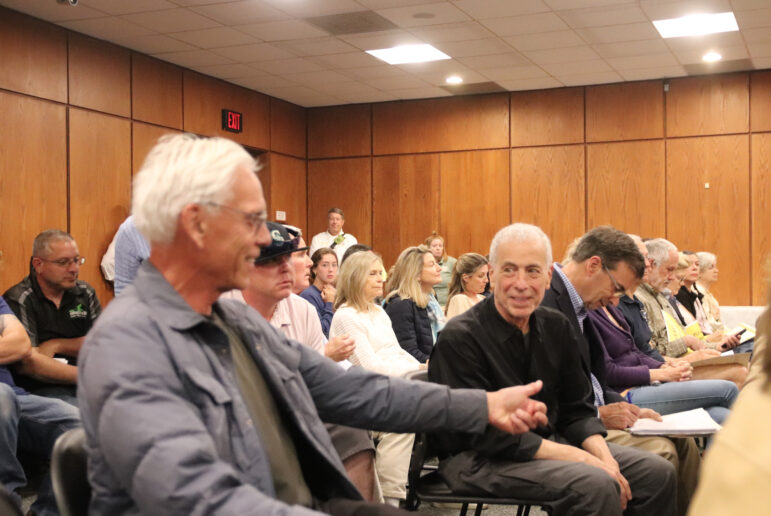
Several landscapers spoke out against the increased restrictions, saying they were cost prohibitive and unfair, given they wouldn’t apply to golf courses or town property.
The proposal crafted by Quiet Yards Greenwich is for a phased approach to the decrease in use of gas leaf blowers over several years.
The changes would to apply to residential lots only – not golf courses or town property – and would give a year for education and awareness. Then, in year 2, 3, and 4 the window within which gas blowers are allowed would slowly diminish to the first two weeks in April for spring cleanups and one month in fall for leaf removal, from Nov 15 to Dec 15.
The proposed ordinance is modeled after one in neighboring Bedford, NY.
Proponents of limits to gas-powered leaf blowers were disappointed that the Health Dept emailed the Connecticut Grounds Keepers Association, the state lobbying association for landscapers, to invite them to the hearing, and that an email to business owners referred to Quiet Yards Greenwich as “an outside advocacy group.”
Elizabeth Dempsey of QYG said, “We are not outsiders. Every single one of us are Greenwich residents – either born in Greenwich or here for decades.”
Health Dept director Caroline Baisley addressed the lawn, yard and tree professionals, saying, “We wanted to hear whether or not you had any concerns. The board and the Dept of Health believe that government transparency is paramount.”
Baisley explained that Quiet Yards Greenwich’s proposed phased-in proposal was defended with materials that are reviewed by a sub-committee of the board.
“It involves noise levels and pollution associated with illness and maybe more serious health effects,” she said. “We take this very seriously.”
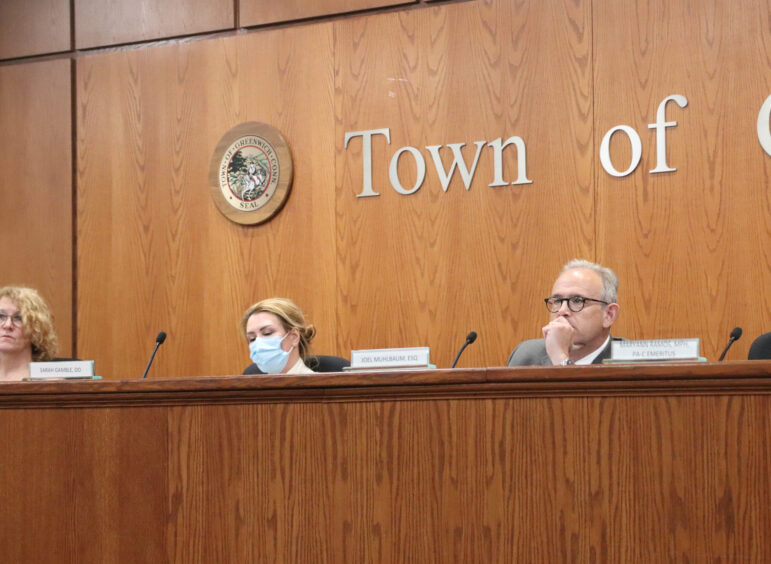
Board of Health Chair Joel Muhlbaum said his board would not ask questions during the hearing. Nor would they take an immediate vote.
The speakers kicked off with the owner of Roberto Fernandez Landscaping who said the proposed restrictions were not gradual enough.
He said the current rules* limiting use of multiple leaf blowers from Memorial Day weekend to Labor Day weekend and just one blower per property per 1/4 acre were followed by the larger landscaping companies, but that the small landscapers break the rules by working late at night and on weekends.
(*Section 6B-6 of Town code: No person shall operate or permit the operation of any gasoline-powered leaf blower between 6:00 p.m. and 8:00 a.m. Monday through Friday and between 3:00 p.m. and 9:00 a.m. Saturday, Sunday and Holidays.
(4)Commercial and/or residential property parcels of one-quarter (1/4) acre or less may only be serviced by one (1) gasoline-powered leaf blower at any given time.
(5)Premises located in the Town of Greenwich may only be serviced by one (1) gasoline-powered leaf blower, at any given time, from Memorial Day through Labor Day, inclusive.)
“The technology is not there yet (for eblowers) for commercial use,” Fernandez added. “Right now the eblowers are made for homeowners and small properties.”
He said his business had 30 gas-powered leaf blowers and that eblower batteries only last for 20 minutes or less, and he would need about 300 batteries for his crews to operate, never mind having to create a system to recharge them.
He estimated 300 batteries would require a $90,000 investment.
Fernandez also said batteries were a potential fire hazard and were time consuming to disconnect and load back onto the blowers.
He requested continuing with the existing restrictions and increase enforcement administering fines to violators. He also suggested homeowners pay for eblowers for landscapers to use.
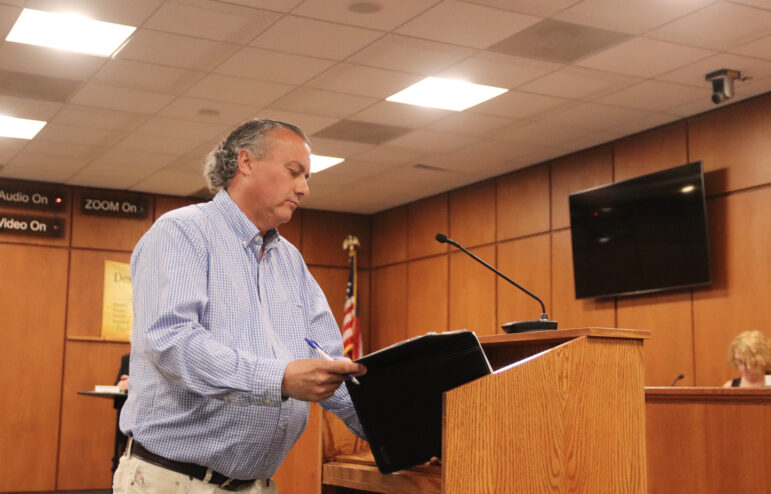
Many in the audience groaned when Mr. Fernandez suggested the proponents of the restrictions were “a small group” and a survey of residents should be done.
Quiet Yards Greenwich did conduct a survey as part of their research. They said the vast majority of residents surveyed desired a meaningful reduction in the use of gas-powered leaf blowers.
Elizabeth Dempsey, who co-chairs QYG with Jane Owen Brash, said, “Because of a lobbying group, they all say, ‘They’re not there yet.'”
The power of leaf blowers is measured in CFMs, which is short for cubic feet per minute.
She said QYG compared models and did a cost-benefit analysis, and that currently the most powerful hand held leaf blower on the market today is an electric leaf blower.
“Electric handheld blowers are now more powerful than gas handheld blowers and the electric backpack blowers are 80% (as powerful),” Dempsey said. “We’re not looking to ban spring cleanups or fall cleanups. It’s a warmer weather, seasonal limit, and having 80% of the efficiency shouldn’t impact a business owner much at all. If you’re talking about removing grass clippings – Scotts Lawncare says not to take the grass clippings off – you shouldn’t need 1200 CFM to do that.”
“Also, backpack blowers, they’re coming out with an 800 CFM (electric model)…which gets closer to the most powerful gas blowers at 1000-1100 CFM,” Dempsey added.
Second, she said, today it costs about $1200 for a commercial-grade back-pack eblower including models from Husqvarna and STIHL that are used by 20+ electric landscapers currently serving Greenwich and Westchester.
“The way to think about it is you’re buying all your gas and fuel upfront. There is an up-front cost but you’re not going to the gas station to refill your containers,” she said. “To the point of economic benefit, every landscaper we interviewed, all said the best part about this is it saved them money. One said it saved about $1,000 a quarter.”
She said a local landscaper, Nelson Munoz who owns Chiappetta-Fierro, and handles one of the larger condo complexes in Greenwich, is moving to all electric. She said Munoz had taken out a zero-interest loan to work toward that end.
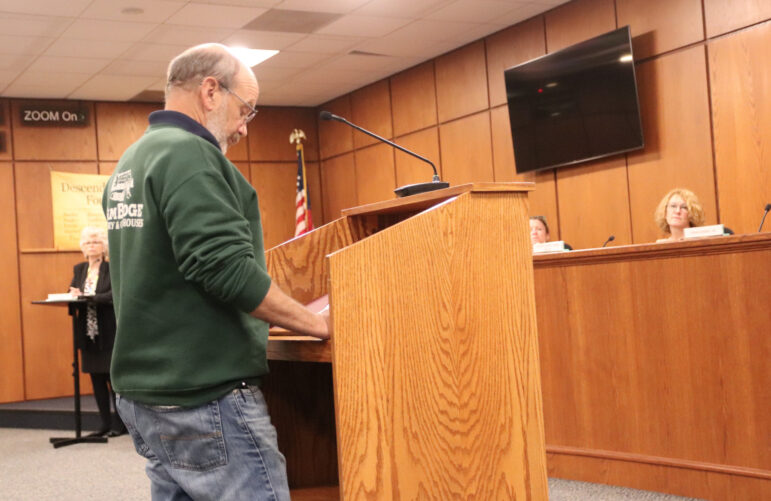
Ron Bridge from Sam Bridge Nursery & Greenhouses, who also offers landscaping services, said electric blowers are cost prohibitive, are heavier for the user, are less powerful and have a shorter run time on their batteries.
“Technology is getting there, but it’s not quite there yet,” he said, adding that there were wait lists for eblowers.
“There’s no local labor,” Bridge added. “Typically landscape crews get people from other countries to come and work. Most of them start in March when a lot of people start their clean ups, so there is a restriction there for commercial landscapers.”
“There is a misuse of leaf blowers,” he did acknowledge. “Hopefully we can come up with some mutual agreement with everybody and try to make things better, health-wise and noise-wise. Educating the personnel using the blowers would be very helpful.”
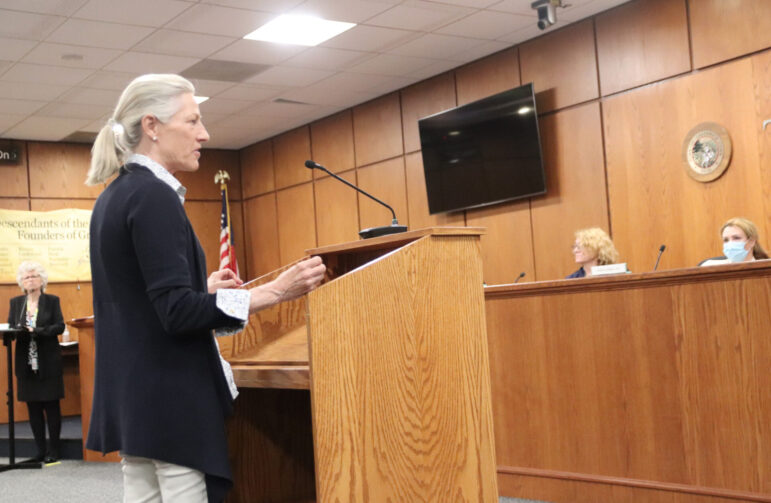
Leslie Petrick, a lifelong Greenwich resident, said growing up in Greenwich, summers were wonderful. “I’m just wondering at what point did we allow gas powered leaf blowers to ruin our summers. I’m sure everyone in this room has experienced the smell and the noise, and some event that has been effected by that.”
Cliff Abrams who works in his home studio in Cos Cob said he was aware of environmental issues with gas leaf blowers, but emphasized that frequently he found the noise to be “unbearable.”
“It’s like the debt ceiling, we should look arriving at some middle ground,” Abrams said. “For our part we just invested in an electric lawn mower and like the rest of our neighborhood we leave the clippings on the ground,” Abrams said. “Sometimes the noise is just really too much.”
Katherine Briggs of Briggs Landscape Design said the time windows were too narrow because in summer they blow to remove clippings and trimmings, from leaves from gutters.
She said she’d been renting and borrowing electrical equipment but that she didn’t believe the technology was “not there to support a landscaping business.”
“The cost to me to use battery power during fall or spring is cost prohibitive and will increase costs for the homeowner. For years and years the market is, ‘Who can cut my lawn for cheaper cheaper cheaper?’ We need some time to adjust.”
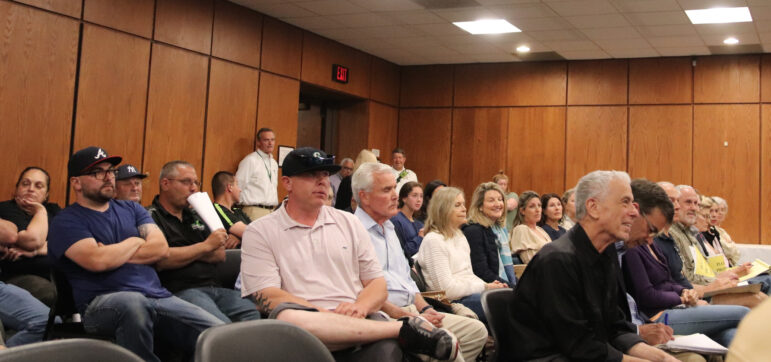

Several people gasped when Briggs said it cost about $850 for a gas pack blower and about $8,000 to buy an electric blower. “And you have to by multiple chargers,” she said.
“The bigger guys can operate it. Ceci and Sam Bridge can obviously explode in this,” she said, arguing argued that smaller operations would have more challenge.
As for the technology, she said, “We’re getting there.”
“And, are homeowners going to let me plug it into their homes?” she asked.
Several in the crowd shouted, “Yes!”
“Fifty of my clients do,” said Jeff Cordulack, who also approached the podium, but turned and addressed the landscapers in the audience.
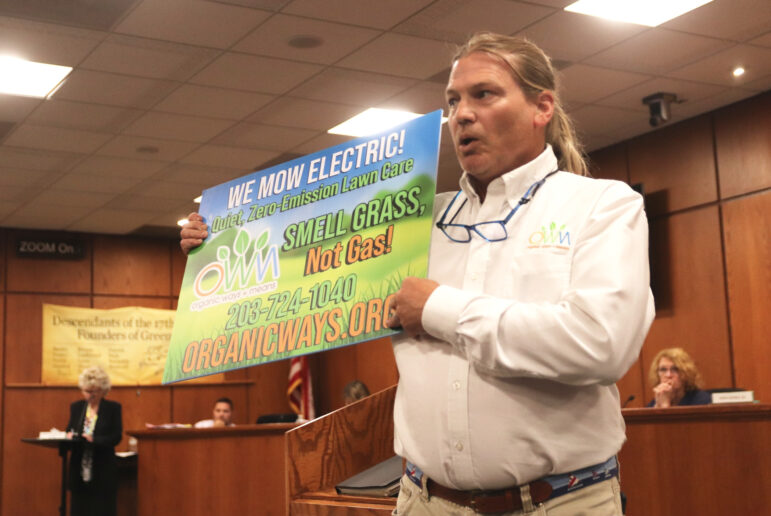
Mr. Cordulack, who was director of Audubon Greenwich for 10 years, said he started a company five years ago after having become an expert in organics and certifying landscapers to be organic.
“I would never be a landscaper unless I started a company five years ago that was electric. Playing with gas is dangerous. Employees hate it. I have employees now who work for me, they won’t leave me because every day they had headaches working for gas-powered companies.”
“Gas powered guys are great landscapers, there’s nothing wrong with them, they’re just resistant to change,” Cordulack added. “I’m in year five, my equipment is fine. I’m doing great. I have over 60 clients, 30 of which are in Greenwich – some of them are 25 acres.”
“I do spring cleanup, summer mowing, fall cleanup – all electric mowers, blowers, trimmers, chainsaws,” he said. “Anyone who comes to this mic and says they just can’t do it has never tried it.”
“I have huge properties, and I have tiny, they all work, and all my clients let me charge at their place, but I don’t have to. I can set up in my truck,” he said. “I have about 50 to 60 lawns. Guess how much I don’t spend in a week? About $300 in gas.”
“I’m not spending $10,000 a year on gas, that’s why Nelson switched one truck. Nelson tried it last year with one truck. I have a feeling Nelson is going to switch to more trucks, and more trucks, and more trucks, because guess what? The employees on his electric team don’t want to go back.”
Eunice Burnett, who is on the board of Audubon CT and the Nature Conservancy of CT, said her comments concerned habitat conservation.
“I suspect that many of us remember a time when people had to rake leaves, and the crazy aesthetics we have today did not exist. I think that part of the problem is homeowners in town think everything needs to be pristine at all times. It’s not great for pollinators. A lot of birds and pollinators are necessary for our ongoing health as humans,” Burnett said.
Hal Stillman said, “When the leaf blowers go on, the reverberation and noise is incredible.”
“I’m an engineer. I understand the battery technology and its evolution. We could switch to electric leafblowers. It’s not going to be a problem,” he said. “The issue is this temporary tidiness that is afforded by blowing debris around, versus my health. I work from home and many times I hear a lot of noise. My neighbors use a crew of four on a small property. Everyone has a backpack blower and one has a wheel blower and they try to get the job done very quickly.”
“I would really welcome a quiet summer,” Stillman said.
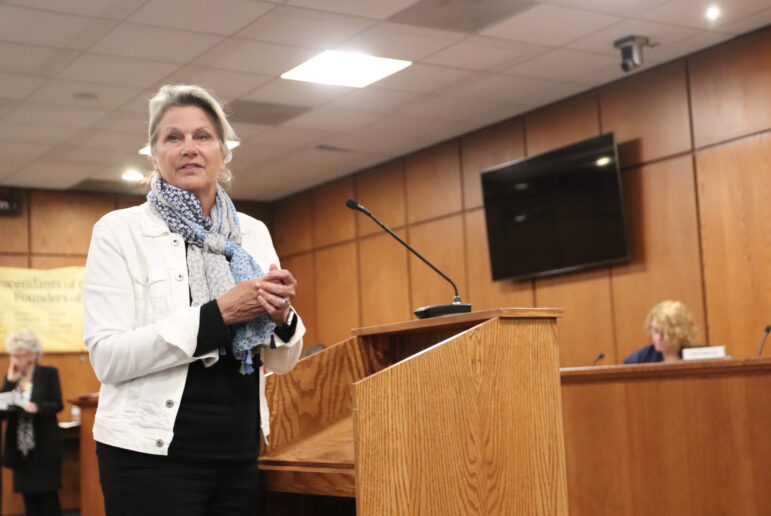
Jane Owen Brash said it is typical to see landscapers blowing when there is nothing to blow.
She said turning an electric blower on and off is easier than with a gas powered leaf blower, and by not running them non-stop the batteries last longer.
“Gas leaf blowers are tough to start and stop, which is why you see them walking around town blowing indiscriminately,” she said to applause.
Svetlana Wasserman, who is part of Quiet Yards Greenwich, disputed those who claimed that Lithium-ion batteries were dangerous.
“I don’t know if any of you have had these devices explode, but I would ask you to evaluate the scientific data on how often things like that happen, as well as the claim that disposing of a gas-powered leaf blower is somehow safer than disposal of a battery,” Wasserman said.
As for the claim, ‘We’re just not there yet,’ she said that claim about technology had been made 30 years ago when a similar request was made, and more recently 10 years ago.
“I would venture to say that we’ll hear it again 20 years from now,” she said. “Listen to the people who actually do use the tech every day for their business, successfully, and say they are able to operate within the same margins of profit.”
She said the recommendations made were not radical. “They are no different than the ones in place in 23 different municipalities in Westchester.”
“No one is asking them to throw out all their equipment. We are asking them, on a replacement basis, to please invest in a few electric blowers, and use those during the times of the year that the restrictions we’re asking for are in place,” Wasserman added.
Jack McDermott, a longtime resident of Riverside, had the last word. McDermott said he hadn’t been aware about the toxins released from gas-powered leaf blowers until recently. Though he said he did find the noise annoying and intrusive, but moreover he was concerned about the risk to children in particular from gas leaf blowers.
“There has to be compromise from all sides,” he said. “It’s very important for something to happen.”